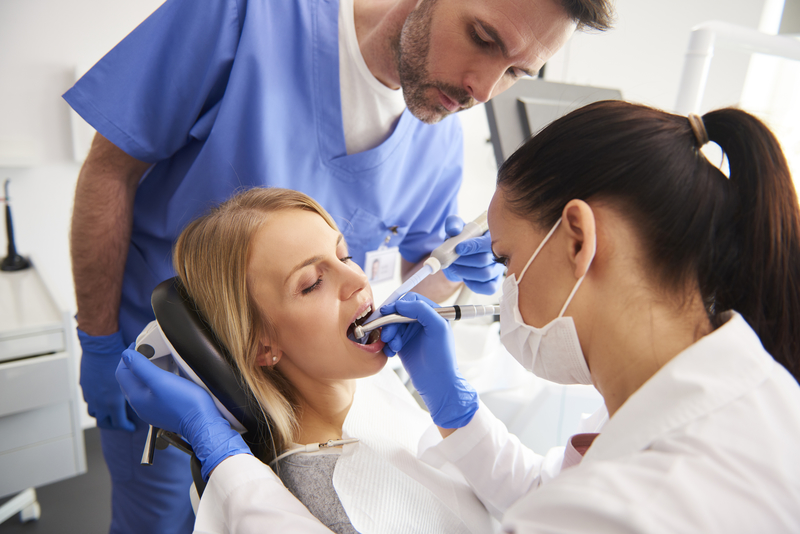Reasons to Schedule Your Dental Visit Before School Starts
July 10, 2019What Happens When You Don’t Brush and Floss Your Teeth?
July 24, 2019
More than 5 million teeth are knocked out each year in sports. That’s just in sports! More than 120 million Americans are missing teeth from oral health diseases like gum disease and tooth decay. More lose their teeth due to dental injuries from cracked teeth, trips, falls, getting hit in the face or accidents on vacation. The latter can be tricky, as you can have a dental accident while on vacation without your usual dentist. What do you do? What if you’re in another country? What if you’ve knocked out a permanent tooth? You don’t want to be another statistic that’s lost their teeth for good. Here are tips for what to do about dental injuries on vacation so you don’t lose your teeth permanently!
Common Dental Injuries
Our teeth are the strongest substance in our bodies, but even they are susceptible to decay and accidents. Each year, dental offices are filled with millions of patients who have suffered some type of dental injury, whether playing sports, a fall or simply by accident. Many of these injuries are preventable but oftentimes occur whenever we least expect them to, especially while we’re on vacation. The most common dental injury that many Americans will experience is a cracked tooth. Cracked and chipped teeth are typically repaired by reattaching the broken piece, replacing it with a tooth-colored filling or using an artificial crown to restore it. Another common injury is a dislodged tooth, which occurs whenever a tooth is pushed sideways, upwards or downwards into the socket. While painful, a dislodged tooth is typically repositioned by a dentist or a root canal is administered if it is a permanent tooth that has been affected. One of the more serious dental injuries is a knocked-out tooth, which will need immediate attention. A knocked-out tooth can be saved if it’s restored to its socket within 30 minutes to one hour, but the root surface needs to be intact. Once it’s fitted back into the socket, a splint will be placed on the tooth to stabilize it for the next few weeks. A root canal treatment will then be performed to restore the tooth completely.
What To Do When You’re On Vacation
None of these dental injuries are a fun experience, but they seem to be especially bad whenever they occur on vacation, when you’re travelling or while you’re out of the country. Unfortunately, each of these occur to many patients each year while they’re away from their homes and dentists. To begin, if you crack a tooth on vacation, first apply a cold compress to the affected area and go to a dental office or the emergency room as soon as possible. For a broken tooth, rinse your mouth with warm water to clean it before applying a cold compress to it. If you can, call your dentist and ask for further instructions. For a knocked-out tooth, take extreme precaution when handling the tooth. Hold it by the crown and wash it off with water if it’s dirty, but do not scrub it as it can remove tissue fragments. If you can’t hold the tooth in its socket, put it in a cup of milk and get to the dentist as quickly as possible, or put it in Save-A-Tooth solution, which can keep the tooth for up to 24 hours. Either way, you need to visit a dentist as soon as possible to ensure its survival.

Prevention Over Treatment
Though you can never predict when a dental injury will occur, it’s always best practice to prepare yourself for the worst-case scenario, which will help prevent most injuries. To ensure that your teeth are healthy, make sure to schedule a dental checkup before you leave. During your appointment, the dentist can identify any underlying issues that you may be unaware of, thoroughly clean and examine your teeth and finish any dental work, like a root canal. It’s important to have your entire root canal completed before you go, in case an infection arises or pain develops from pressure while flying. If you’re going to be gone for an extended period of time and you still have your wisdom teeth, it’s also a good rule of thumb to have at least the lower wisdom teeth removed before you go. When traveling to less-developed areas or countries, make sure that you’re updated on your Hepatitis B vaccination. Never assume that dentists in these areas are vaccinated; protect yourself by staying up-to-date on vaccinations in case you do need emergency dental care while you’re abroad.
Your daily routine before, during and after you’re home from vacation should include brushing and flossing. These simple tasks do wonders against the prevalence of tooth decay in the mouth and should be completed every day. Brushing and flossing removes leftover food particles and decay-causing plaque that easily accumulates on the teeth, keeping your mouth healthy and happy. For added protection against bacteria, use a mouthwash each night to neutralize acid and promote fresh breath.
Protect Your Teeth With Our Help
Whether you’re vacationing locally or abroad, it’s important that you take care of your oral health before any mishaps occur. At Family & Cosmetic Dentistry of the Rockies, our team is equipped with the experience and materials that you need to keep your teeth healthy and beautiful for years to come. Call our office today at (970) 267-0993 to schedule your next dental checkup!




